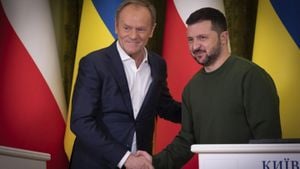Germany finds itself at the brink of significant change as voters prepare to head to the polls on February 23, 2025. It marks the first major election since the collapse of Chancellor Olaf Scholz’s coalition government, which left the political climate fraught with tension and uncertainty. The election is not merely about governance; it reflects the country’s struggle with rising extremism and complex socio-economic challenges.
Friedrich Merz leads the Christian Democratic Union (CDU) and its Bavarian sister party, the Christian Social Union (CSU), as they aim to regain power after years of dominance by the Social Democratic Party (SPD). The CDU/CSU coalition is projected to clinch around 30% of the vote, making it the front-runner according to various polls. Meanwhile, the SPD, under Olaf Scholz, appears to be trailing behind with just 15% predicted support, which would represent one of its poorest showings since the party's inception.
On the other side of the political spectrum, the right-wing Alternative for Germany (AfD) is expected to make historic gains, potentially reaching around 20%—doubling its 2021 election results. Isabelle Guineaudeau from CNRS remarked, "L’AfD pourrait réaliser un score record depuis sa création en 2013," underlining the remarkable emergence of this party, largely fueled by its anti-immigration stance and growing visibility within German politics.
The backdrop of this electoral battle is multifaceted, with the topic of immigration front and center. Following several violent attacks linked to refugees, the theme has overshadowed other issues, provoking fear and anger among the electorate. "L’immigration s’est imposée comme le thème central de cette campagne, éclipsant tous les autres sujets," noted Guineaudeau, emphasizing the singular focus of party campaigns on immigration—a sharp deviation from previous electoral discussions involving budgetary and environmental concerns.
This shift reflects public sentiment shaped by recent events, including violent incidents attributed to individuals seeking asylum, leading to widespread calls for stricter immigration policies. Alice Weidel, leader of the AfD, advocates for stringent measures against unauthorized immigrants, including mandatory deportation for those convicted of crimes, asserting her party's commitment to reversing the immigration policies of previous governments.
The economic backdrop also plays a pivotal role, as Germany grapples with the repercussions of recession and inflation. The automotive sector, key to the national economy, is particularly affected, with rising energy costs exacerbated by competition from China. This economic strain positions the CDU as the party promising significant tax cuts for citizens and businesses, contrasting starkly with the SPD’s proposals for tax hikes aimed at addressing disparities.
The dynamics within these elections are also colored by international influences. Notably, the AfD has garnered attention from higher-profile figures, including American billionaire Elon Musk, who recently tweeted his support for the party, asserting only it can rescue Germany. His involvement raises alarms about the normalization of extremist political discourse, as activists caution against the alliance forming between the AfD and mainstream conservative parties.
The potential for today’s elections to fundamentally alter the German political scene cannot be overestimated. Traditionally, the CDU/CSU and SPD have dominated the political arena, typically securing over 50% of the electorate's support combined. This year, experts predict they may fail to reach this threshold for the second time since 1949, reflecting the shifting loyalties of the German populace.
Coalition talks will undoubtedly follow the elections, and Merz has maintained he will not form alliances with the AfD, which could complicate the political architecture should the elections yield fragmented results. Yet, the recent voting collaboration between CDU/CSU and AfD on immigration initiatives, which shocked many observers, suggests the lines may blur as political expediency takes precedence over ideological divides.
Such collaborations could set the stage for the AfD to exert greater influence on policy, even as Merz reiterated, "Nous sommes fondamentalement divisés sur de nombreux points, en matière de politique économique et de politique migratoire," indicating potential unrest within the conservative bloc if engagements with the AfD deepen.
While votes are being cast today, the stakes are high for the future of Germany’s political identity and for the European model of governance, which has long favored collaborative consensus over polarization. The outcome of the election could not only reshape the Bundestag but also redefine national and international perceptions of Germany as it navigates the turbulent waters of extremism, economic challenges, and the legacies of past policies.



